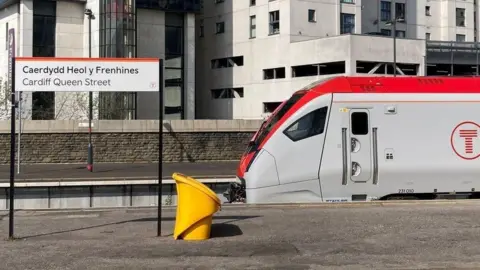Is Wales on track for new rail money? It might be
 BBC
BBCWe look to be edging slowly further down the tracks towards confirmation of new rail funding in Wales.
Transport Secretary Ken Skates – who appears to be growing in certainty that something is about to arrive - told the Senedd on Wednesday that he has been trying to persuade the UK government to pay for five new stations between Cardiff and the Severn Tunnel.
All will be revealed at Chancellor Rachel Reeves's spending review next week, but a fortnight ago Skates was "very very confident" Wales would do well and on Tuesday he said that a "pipeline" of work had been agreed with the UK government.
The Welsh government is also thought to be pushing for investment in north Wales including improvements at Padeswood and just over the border in Chester – vital for improving services on this side of the border.
The south Wales plans would involve stations at Cardiff East, Newport West, Somerton, Llanwern, and one serving the villages of Magor and Undy.
Morgan said back in January that talks were taking place on investing in new stations between Cardiff and the Severn Tunnel, the cost of which was put at around £335m by a transport commission.
The Welsh government has also recently published – largely unfunded – plans for a metro service in north Wales.
Providing funding would make logical sense - Reeves wants to invest in big infrastructure projects – and political sense too with Welsh Labour up against it in the polls 11 months from the Senedd election.
UK government sources are not pushing back against the prospect that funding for rail improvements might be forthcoming and BBC Wales has been told that next steps on transport infrastructure spending will be set out at the spending review.
It is understood that the Welsh Secretary, Jo Stevens, has been pressing hard to get the Chancellor, Rachel Reeves, and the Treasury, and I am using Eluned Morgan's words here, to "cough up" on rail.
But, even if Morgan were to get the money needed for those schemes, she will still face accusations from opposition parties and many within Welsh Labour that Wales continues to be short-changed.
They argue that Wales should be funded with anywhere between hundreds of millions and billions more pounds, as a consequential for schemes being built in England but which are designated England and Wales projects.
And they would like the classification of some of the most prominent, and controversial ones, changed.
On Wednesday, billions of pounds for schemes across northern England and the Midlands, which on first glance prompted the question: what about Wales and what about consequential funding?
The simple answer to part one is - wait until next Wednesday; to part two - there should be consequential funding for bus and light rail schemes but not heavy rail, which is classified as England and Wales, with funding details to come.
'Fundamental injustice'
On Tuesday a separate announcement on heavy rail sent familiar arguments hurtling back down the tracks.
Confirmation that Wales will not get a single consequential penny from a proposed new line between Oxford and Cambridge have led to accusations that it is HS2 "all over again".
HS2 is the long-running and high profile rail-funding sore. Plaid Cymru says that Wales is owed £4bn pounds, a figure previously used by Welsh ministers who now say it is £350m and rising. The Liberal Democrats put the figure in the hundreds of millions - and the Welsh Conservatives call for "fair funding" too.
Back in January the first minister herself called the England and Wales classification of HS2 a "fundamental injustice".
At the same time a UK government source said they could not "fix" an injustice they had inherited from the previous Conservative government.
Another scheme with similar issues to HS2 has allowed opposition parties – and some Labour politicians – to build up a head of steam before Reeves' announcement next week, although they would have been likely to make points about underfunding in the aftermath in any case.
On rail Eluned Morgan might get something from one hand next week, but have something held back by the other.
Throw in UK Labour decisions on welfare reform, National Insurance contributions for public sector employers and potential changes to farming funding - all likely to disproportionately affect Wales – and it does not make the first minister's job any easier.
And all this is before we get the expected confirmation of a squeeze on day-to-day public spending.
Morgan has adopted a new strategy to "call out" her Westminster colleagues when they, in her view, harm Wales, but she also needs them to deliver.
If they do not – or are not judged to have delivered – then it presents the first minister with some issues when she tries to convince voters next May.
Waiting in the sidings after the chancellor's speech are eager opposition parties, buoyed in some cases by recent polling, to tell you that two Labour governments working together are not on track.
